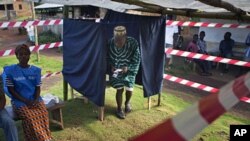Now that Liberia’s elections are over, observers are looking at what went right and what didn’t. While the general consensus is the process was free, fair and transparent, there were incidents and violence and some technical and managerial problems.
President Ellen Johnson Sirleaf has won a second term in office after a contentious election, including an opposition political party boycott and a deadly confrontation between police and opposition demonstrators. She promised to work to unite the country.
“There is a cooling off period that needs to be a serious, reflective, analytical review process,” said Oscar Bloh, director of Search for Common Ground – Liberia.
He said it should involve all political parties and stakeholders “to ensure that we learn from some of the mistakes that have been made over the past nine months and we prepare for more elections that will be held when the U.N. will be gone.”
The review process should not be led by the National Electoral Commission (NEC), Bloh said, but rather the Law Reform Commission or the Governance Commission with “active involvement of civil society.”
He described Liberian society as “highly polarized” following the election.
Going alone in future?
“I think that the electoral process, especially in October and again with the runoff, was quite an impressive example of free and fair and transparent elections,” said Kate Cummings, program manager for the NGO Ushahidi Liberia, which promotes peace building. “One of the major reasons why I think this was possible was from a significant amount of support from the international community.”
Cummings said there was also a great deal of international support during the 2005 poll.
She said, “I think in the future what will really be an important difference is that maybe at the next election there will be even less international support for the electoral process, even more expectation that Liberians will handle the entire process on their own, as well as the security. And will Liberia ever really have to step up to that challenge at that time?”
Better management
Nat Walker, who works with the government’s peace building office, said, “I think that most of the problems that erupted and spread out into bigger problems came out from just simple administrative errors from within the elections commission. So there is a need to look at the whole structure.”
He said a problem such as a ballot error can become a major issue if the problem is not communicated quickly and effectively to voters.
“It’s not just the elections law, but just the way in which NEC is run on a day to day basis needs to be looked at very critically,” said Walker.




